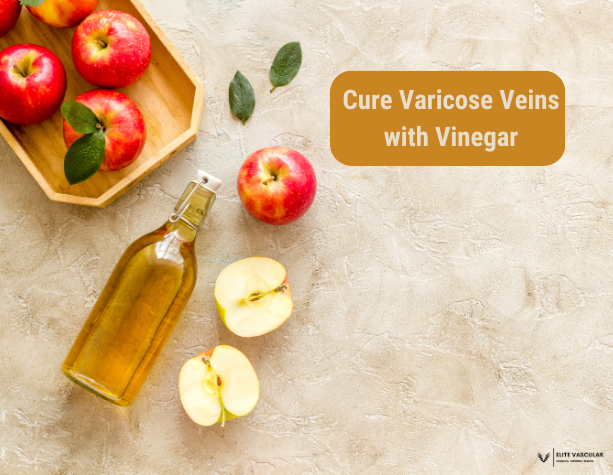- admin
- 0 Comments
Did you know apple juice vinegar might help lessen varicose veins? Some reports suggest so. Lots of folks know apple cider vinegar. Yet, few realize it’s a potential varicose vein remedy. Various articles claim this vinegar can show impressive results for varicose veins.
Apple cider vinegar will not immediately eliminate varicose veins, despite the fact that most health authorities do not consider it dangerous. Once varicose veins have formed, natural remedies are unlikely to make them go away. Fortunately, there are more efficient methods such as RFA, Venaseal, Varithena and sclerotherapy that can be used to treat varicose veins directly in the office environment using local anesthetic. Maybe if you try it in the beginning it will work for you.
How Does Vinegar Help with Varicose Veins?
Firstly, let us define the mechanism by which vinegar effectively treats varicose veins. Varicose veins occur when the integrity of the vein walls weakens, leading to the accumulation of blood and the formation of twisted and swollen veins. Vinegar, particularly apple cider vinegar, includes acetic acid, which has anti-inflammatory and circulation-enhancing characteristics. The aforementioned attributes make vinegar a superb remedy for varicose veins.
Apple cider vinegar has antioxidant qualities that have the ability to enhance blood circulation and flow. Moreover, it may aid the body in eliminating detrimental toxins and free radicals. Increasingly, research is indicating the extensive impact of the gut microbiota on human health, specifically in relation to cardiovascular health. In the next years, our objective is to collect more data about this potential benefit.
Varicose Veins
Poor blood circulation causes leg varicose veins. When vein valves don’t operate correctly, blood collects in the afflicted vein, causing swelling. Many factors cause varicose veins, however aging is the primary one. Our legs wear out over time. However, family history may also cause varicose veins. Hereditary genes may affect varicose vein risk.
Varicose veins are more common in women and connected to pregnancy and menopause. Varicose veins may also be caused by lifestyle. You are more prone to have them if you stand a lot at work, which might strain vessels and trigger valve failure. A bad diet and lack of exercise will contribute. Food rich in fat or trans fat may clog veins and arteries. Alcohol and smoking are also associated to the disease.
Cure varicose veins with vinegar
With the benefits of vinegar for varicose veins explained, the next step is to figure out how to use it. For the best results when using vinegar as a treatment, follow these steps:
Step 1: Create a Vinegar Solution
In a dish or other container, combine equal parts water and vinegar (apple cider vinegar is preferred). Until everything is properly incorporated, give the mixture a good stir.
Step 2: Apply the Solution to Affected Areas
Apply the vinegar solution to the locations of your varicose veins gently using a clean cloth or cotton ball dipped in it. Apply the solution to your skin in a circular motion and let it on for about 10 minutes.
Step 3: Elevate Your Legs
Raising your legs after applying the vinegar solution might help increase blood flow. Get into a lying down position and use cushions or a wall to support up your legs. To alleviate swelling and pressure on the afflicted veins, elevate your legs.
Step 4: Repeat Daily
To get optimal outcomes, it is recommended to do this procedure on a regular basis, ideally in both the morning and evening, for duration of several weeks. Ensuring consistency is crucial for effectively treating varicose veins with vinegar.
There is no scientific proof to back up the notion that apple cider vinegar may remove spider veins. While some people claim anecdotal advantages, clinical research does not support the usefulness of apple cider vinegar in treating varicose veins. Sclerotherapy, laser therapy, and other procedures indicated by a skilled healthcare practitioner are the best ways to treat varicose veins. It is best to get the advice of a dermatologist or vein expert for an accurate diagnosis and treatment choices.
